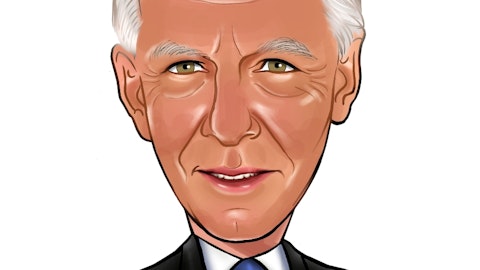Attachment points did not come down. So, reinsurers held on what they achieved in 2023, continuing to expose our clients’ balance sheets to attritional volatility moving forward. So, that certainly didn’t change. But overall, I thought it was a positive renewal. Clients bought more capacity at the top of cat programs. You saw some of those reported in the marketplace. So, clients were able to get more capacity than last year, achieve their objectives, as John noted. John talked about risk-adjusted rate increases. For clients with non-loss impacted portfolios, they saw a range of flat to high single-digit kind of rate increases, but clients with cat losses were in the 10% to 30% rate increase range, right? So, I think that was pretty robust in both kind of the US and European markets.
Maybe a minute on casualty as well. In prior calls, we talked a lot about casualty and increased scrutiny of casualty portfolios heading into the 1/1 renewal. Reinsurers have been expressing concerns about adverse loss development now for several quarters and real and social inflation. However, I would say that at 1/1, that pricing movement was more constrained, slightly more muted than we anticipated kind of earlier in the fourth quarter. That said, as John, as John mentioned, there was downward pressure on seating commissions for quota share contracts. And excess of lost contracts saw double-digit rate increases moving forward. But in the casualty renewal, I would say overall capacity was adequate.
John Doyle: Thanks, Dean. Jimmy, I would add, just in both the insurance and reinsurance market, the pace of loss cost inflation in casualty is the great unknown at the moment. We all know it’s increasing. We all see mounting evidence of it, but that’s the challenge for all of us in the market to sort through at the moment. Do you have a follow-up, Jimmy?
Jimmy Bhullar: Yes. Just on fiduciary investment income. So, it had been increasing at a pretty sharp rate and declined modestly sequentially. Is that a function of just what’s happened with interest rates or something to do with fiduciary balances or seasonality or something else?
John Doyle: Sure. Mark, you want to?
Mark McGivney: Yes. Jimmy, it is seasonality. Our balances tend to have a pattern of seasonality. It results in – Q4 and Q1 tend to be seasonal lows for average balances. So, it’s purely a function of that.
John Doyle: Thanks, Jimmy. Operator, next question, please.
Operator: And our next question comes from the line of Michael Zaremski with BMO Capital Markets.
MichaelZaremski: Good morning. Back to the organic growth commentary, especially on the brokerage side, you’re loud and clear on kind of some of the pluses and minuses. I didn’t hear anything about any influence from maybe a diminishing tailwind from some of the excess hires you’ve made in past years. Is that a dynamic we should be thinking about as we think about 2024 and 2025?
John Doyle: Yes. Thanks, Mike. No, I don’t think so. We continue to invest both organically and inorganically, maybe not that at the pace of a few years ago, but that’s an important metric for us that we track around how we’re driving production capacity in all of our businesses. So, as I mentioned in my prepared remarks, we think the macro environment continues to be supportive of growth in our business. Nominal GDP will drive some growth. Inflation, while easing, is still elevated, tight labor markets. We were just talking about the cost of risk in casualty as well. And as a result of that, we think pricing in the market will maintain – will remain relatively stable as it’s been really throughout most of 2023. So, we’re quite optimistic about 2024.
Our outlook is positive. I would also say a couple of other things. We’re a better business entering 2024. We’ve been working hard at that. Our mix continues to improve. I talked about that a little bit about some of the divestiture activity, but also the inorganic investment we made. And we’ll continue to invest organically in the business as well, and demand remains strong. So, we’re excited about 2024.
MichaelZaremski: Understood. And my follow-up, switching gears a little bit to Mercer. In your prepared remarks, I think you made, John, some comments about medical or health inflation. Some of the data points we’ve seen are – the medical costs for employers should – might accelerate in 2024. Should that have a tailwind or any influence on the health segment specifically? Thanks.
John Doyle: Sure. Health was a terrific story for us in 2023, and helping employers navigate what’s a very, very complex and increasing cost environment will be very much on the top of our agenda in 2024 as well. Maybe, Martine, I’ll ask you to comment a little bit about how we finished the year and what your outlook is around health for 2024.
Martine Ferland: Yes. Thanks, John, and thanks, Mike, for the question. We’re very pleased with the results in health, and we have had a quarter of 9% a year of 10 in overall health, and it comes from all regions, and it comes from many places. Of course, full employment does drive good results there, more people to cover in our employers’ benefit programs. But we also have invested in innovative and adaptive solutions. And medical cost inflation is there, and what it drives for us is a lot of consulting around trying to help clients and their employees control costs by better design, better fit for purpose programs. So, we’ll see. There’s not a huge portion of our business that is actually directly linked to inflation. We have a lot of fee-based revenue in the business.
So, usually, whether there’s a lot of inflation or inflation abates a little bit is not a big factor in the overall results. I think it’s more around access to healthcare, innovative form of healthcare, like digital health, mental health, good affordability for clients and their employees. That’s mostly driving our business results.
John Doyle: Thanks, Martine. Andrew, next question, please.
Operator: Certainly. Our next question comes from the line of David Motemaden with Evercore ISI.





